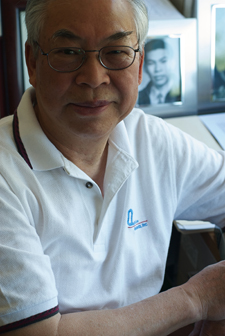Shu Lin Awarded Prestigious NASA Medal
Shu Lin, a professor in the UC Davis Department of Electrical and Computer Engineering, has received NASA’s Exceptional Public Achievement Medal. The honor acknowledges Lin’s 25 years of exceptional service and his “outstanding contributions to the NASA mission,” and cites him as “a world expert in communications.”
 NASA’s Exceptional Public Achievement Medal recognizes non-government individuals for a significant specific achievement or substantial improvement in operations, efficiency, service, financial savings, science or technology. Criteria include work-related achievements that yield high-quality results; innovative approaches used in the conception, design or execution of the individual’s work; and the impact and importance of the individual’s work, in terms of enhancing NASA’s ability to accomplish its mission.
NASA’s Exceptional Public Achievement Medal recognizes non-government individuals for a significant specific achievement or substantial improvement in operations, efficiency, service, financial savings, science or technology. Criteria include work-related achievements that yield high-quality results; innovative approaches used in the conception, design or execution of the individual’s work; and the impact and importance of the individual’s work, in terms of enhancing NASA’s ability to accomplish its mission.
NASA’s Interface Region Imaging Spectrograph (IRIS) Solar Observatory, launched on June 27, 2013, communicated its results via a 7/8 Low-Density Parity-Check (LDPC) code developed by Lin. The IRIS spacecraft’s mission addressed the need to understand the interface between the photosphere and corona, in our sun’s lower atmosphere: a fundamental challenge in solar and heliospheric science.
The IRIS team opened the spacecraft’s telescope door on July 17, 2013, allowing scientists to view the mysterious lowest layers of the sun’s atmosphere; NASA described the data coming in as “crisp and clear, showing unprecedented detail of this little-observed region.”
The information was transmitted via Lin’s 7/8 LDPC code, a linear error-correcting code capable of sending accurate messages over a noisy transmission channel. In recent years, LDPC codes have become increasingly popular in applications that require reliable and highly efficient information transfer over bandwidth or return channel-constrained links in the presence of data-corrupting noise. Aside from their use by NASA, LDPC codes have become a standard for the satellite transmission of digital television, and also are part of the Wi-Fi 802.11 standard.
After obtaining his PhD at Rice University in 1965, Lin served as a faculty member at the University of Hawaii (Manoa) and Texas A&M; he then returned to Hawaii to become Chair of the Department of Electrical Engineering at U:Manoa. He joined the UC Davis College of Engineering in 1999, where he has furthered his research into algebraic coding theory, coded modulation, error control systems and satellite communications. In 2002, Lin was part of the research team that shared in a $5 million DARPA grant designed to further the development of cell phone technology for optical communications.




